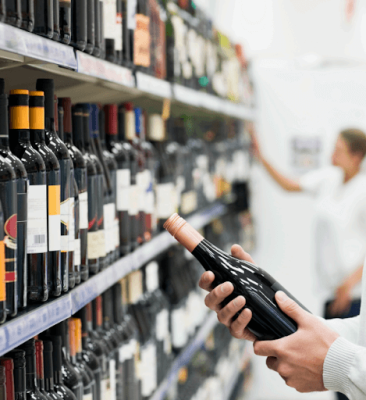U.S. Alcohol Industry Permits for Suppliers
White Paper Series No. 2012-3
US Alcohol Industry Permits for Suppliers
About our white papers: American Spirits Exchange white papers are periodic publications issued by the company to inform the industry that it proudly serves. All information is provided ‘as is’ and not intended to provide tax, legal or other advice. If you have any questions or comments about this or any other of our publications please contact our offices at 215-240-6020.
Copyright 2012. All rights reserved.
Printed in the United States of America. No part of this paper may be used or reproduced in any many whatsoever without written permission.
The following provides a basic overview of the licenses, permits and approvals which are required to legally sell alcohol beverages (wine and spirits) in the United States. It is intended as an introductory guide for companies that want to know what is necessary in order to sell their beverage(s) to distributors and wholesalers. It does not cover the specialized permits required to produce alcohol beverages, such as distillery or winery licenses, or to market and sell alcohol beverages to retail consumers.
INTRODUCTION
Alcohol beverages are one of the most heavily regulated consumer categories in the United States. This strict regulation serves three purposes: first, to verify that what is being offered to consumers is what the producer said they produced (i.e. product “authentication”); second, to ensure that products are safe for consumers; and third, to generate revenue through taxation. The higher the alcohol content the more regulated and taxed. Permits and licensure enable the government to achieve these purposes by tracking alcohol beverages as they move through the supply chain.
Following “Prohibition” the U.S. Federal Government established two principles that would uniquely shape the U.S. alcohol market. First, alcohol sales would go through a three-tier supply chain consisting of suppliers, wholesaler and retailers; generally, a company’s activities in the alcohol industry would be limited to only one of these three possible roles. Second, states would self regulate the movement of alcohol beverages within their boundaries (that is, its distribution and sale).
As a result, the Federal Government and individual State Governments have overlapping authority over the transport and sale of alcohol beverages, and both work to ensure public safety and tax collection through separate sets of permits. The Federal government requires certain permits and licensure in order for an alcohol beverage to be considered legal for sale in the U.S. but the product then needs a similar, complementary set of permits from each state in which it is to be sold. You can’t sell your product without both: the state will not give you a permit without prior federal approval, and you can’t transport or sell your product without that state’s approved permit. It is a two step process.
Finally, the government has structured the permits in a specific way to help them ensure public safety and tax collection: they require permits for both the company and the product. Company permits help identify who has authority – and thus responsibility – for the product and taxes. There can be only one designated party in the U.S. in order to ensure a clear “line of sight” in responsibility. Each product needs a product-specific permit in order for it to be efficiently tracked through the supply chain, down to every bottle sold.
Although it may appear complicated at first, the regulatory system makes sense: a) company permits always come before brand permits, and b) federal permits always precede state permits. Someone needs to assume responsibility before there can be something to be responsible for; the U.S. government has to say that a product is “legal” before a state can allow its movement or sale.
THE PERMITS – COMPANY LEVEL
Company permits come down to a simple principal: if a company is going to benefit from the sale of alcohol beverages (i.e. make money), then they need to take responsibility for the product(s) and the relevant taxes. As we will see, this means that in almost every case, a brand can only be associated with one company.
- COMPANY PERMITS AT THE FEDERAL LEVEL – THE “FEDERAL BASIC PERMIT” The Federal Basic Permit (FBP) is the cornerstone for U.S. alcohol beverage commerce and on which everything rests. Every U.S. entity that will benefit from the sale of an alcohol beverage must have an FBP (the only exception is a bank liquidating goods during bankruptcy).
Every alcohol beverage that is available within the U.S. must come under the responsibility of a U.S. company with a FBP. When a product is domestically produced or imported it will be associated with only one company (i.e. one FBP number) even if multiple companies in the supply chain, such as wholesalers, eventually handle the product. There is one single responsible party.
So while a foreign company does not need an FBP in order to sell its products into the U.S., the product can’t enter the U.S. unless there is a U.S. company with an FBP that has sole authority and responsibility for the brand.
The process to obtain an FBP can take 90 to 180 days. A company can apply for a FBP as either importer, wholesaler or both, depending on whether any of its products will originate internationally.
- COMPANY PERMITS AT THE STATE LEVEL – As discussed above, state permits mirror federal permits. Once a company obtains its FBP it must then obtain its state corporate permit(s). There are two types of company permits at the state level.
First, most states require that an alcohol beverage company based in their state hold the state equivalent of a federal basic permit. This is the license required by your “parent state” (i.e. the state in which you are based, as listed on your federal basic permit, not merely the state you incorporated in, if different). This allows you to conduct business as an alcohol beverage company at your location: company permits are tied to companies AND locations. You may also need traditional non-alcohol company permits as well as specialized permits for the transport or warehousing of alcohol beverages, if you will be performing these functions.
Second, in nearly every state that you intend to sell your product into (i.e. states other than your “parent” state) you will need a special permit giving you permission to ship alcohol beverages across the state border and offer it for sale to the trade. These are generally called “out-of-state shippers” permits, but should not be confused with direct to consumer shipments (an entirely different topic that is not covered here).
The out-of-state shippers permit functions like the FBP for each state. It identifies one, and only one, entity that has authority and responsibility for the brand within the state (i.e. the sole source). Each state is different in terms of its requirements, timing, cost, bonding (to ensure taxes get paid) and permit duration (i.e 1 to 3 years generally). No product can be sold in a state unless it is associated with a company with an appropriate state license.
THE PERMITS – BRAND LEVEL
It is important to understand that brand permits are always exclusively linked to one company at the federal level and within each state; that being said, in different states the brand may be licensed to different companies. For a brand, the federal and state permits have very different roles and do different things: public safety, product “authentication” and product tracking respectively.
- BRAND PERMITS AT THE FEDERAL LEVEL – THE “COLA”
Before any brand can be offered for sale within the United States, it must first be approved by the U.S. Alcohol Tobacco Tax and Trade Bureau (“TTB”) in the Treasury Department.The TTB evaluates each proposed product to ensure that it conforms to strict standards that protect consumers. Product evaluation is two step process.
Step one determines if the beverage is both legal for U.S. consumers. During this process the TTB may request a detailed quantitative list of ingredients found in the beverage, approvals for any flavoring ingredients, a specific description of the method of manufacture and samples for laboratory testing. Its evaluation is informed by FDA laws and regulations. Although many producers consider their recipe a “trade secret” the TTB will require submission of these materials as part of their evaluation process, no exceptions. For common wine varietals from prominent wine making regions with well established wine making processes, this beverage evaluation step is waived by the TTB and such wines go straight to step two.
Step two is an evaluation of the product label and packaging to ensure that it contains proper labeling, mandatory disclosure information, U.S. government warnings and that it is not misleading to the public. Labels are approved “as submitted” and changes (especially changes of any of the text) require a new submission (the most common exception being vintage years of the same wine).
Should the TTB approve of the beverage in its final packaging, then it will grant a Certificate of Label Approval (“COLA”) recognizing it as a legal product to be sold in the U.S. The COLA for a product will be associated with only one company which holds a federal basic permit. For domestically produced products, this must be the company that made the product (i.e. the winery or distillery) for imported products it must be the importer.
- BRAND PERMITS AT THE STATE LEVEL – STATE BRAND REGISTRATIONS Prior to offering an alcohol beverage for sale in a state, the product needs to be registered with the state. This registration process allows the state government to know who is responsible for the brand and to track the volume of product shipped within its borders.
Although COLA approval is a pre-requisite for state registration, each state makes an independent decision if they will allow the product within their state, allow only certain sizes of the product, require additional information and materials as part of its evaluation process, or necessitate a commitment with an in-state distributor.
One requirement in most states is the regular reporting of shipment volumes into the state.
The American Spirits Exchange Ltd.
We believe that success is measured in terms of our clients’ growth. We bring a contemporary, best-practice approach to a deeply historical industry. Our clients don’t just beat their competitors, they change the rules of the game.
Who we work with
Our clients are typically visionary leaders with bold, forward-thinking strategies. Whether emerging or multi-national, domestic or international they eschew the status-quo.
What we do
We help companies save money while increasing their sales focus;, the result is increased case sales and sustained corporate growth. We provide a permitted foundation and take responsibility for streamlining purchase order processing and compliance. Where appropriate, we make strategic and operational recommendations to help them get more out of their business model.
How we do it
We are part of your team. We focus on practical actions that drive your business forward. We get our hands dirty.



